Comprehensive Report on Sources, Rights, and Interpretation of UK Law
VerifiedAdded on 2020/10/04
|9
|2472
|44
Report
AI Summary
This report provides a detailed overview of the English Legal System, examining its sources, including Common Law, statutes framed by Parliament, delegated legislation, and the influence of EU Law. It discusses Parliament's role in law-making, highlighting the involvement of the Lords and the separation of powers between Parliament and the Judiciary. The report also explores delegated legislation, its types, and controls, along with the rights and freedoms enjoyed by individuals in the UK, guarded by relevant institutions. Furthermore, it explains the main rules of statutory interpretation—literal, golden, and mischief rules—and their application in the legal system. This assignment solution is available on Desklib, where students can find a wealth of resources, including past papers and solved assignments.
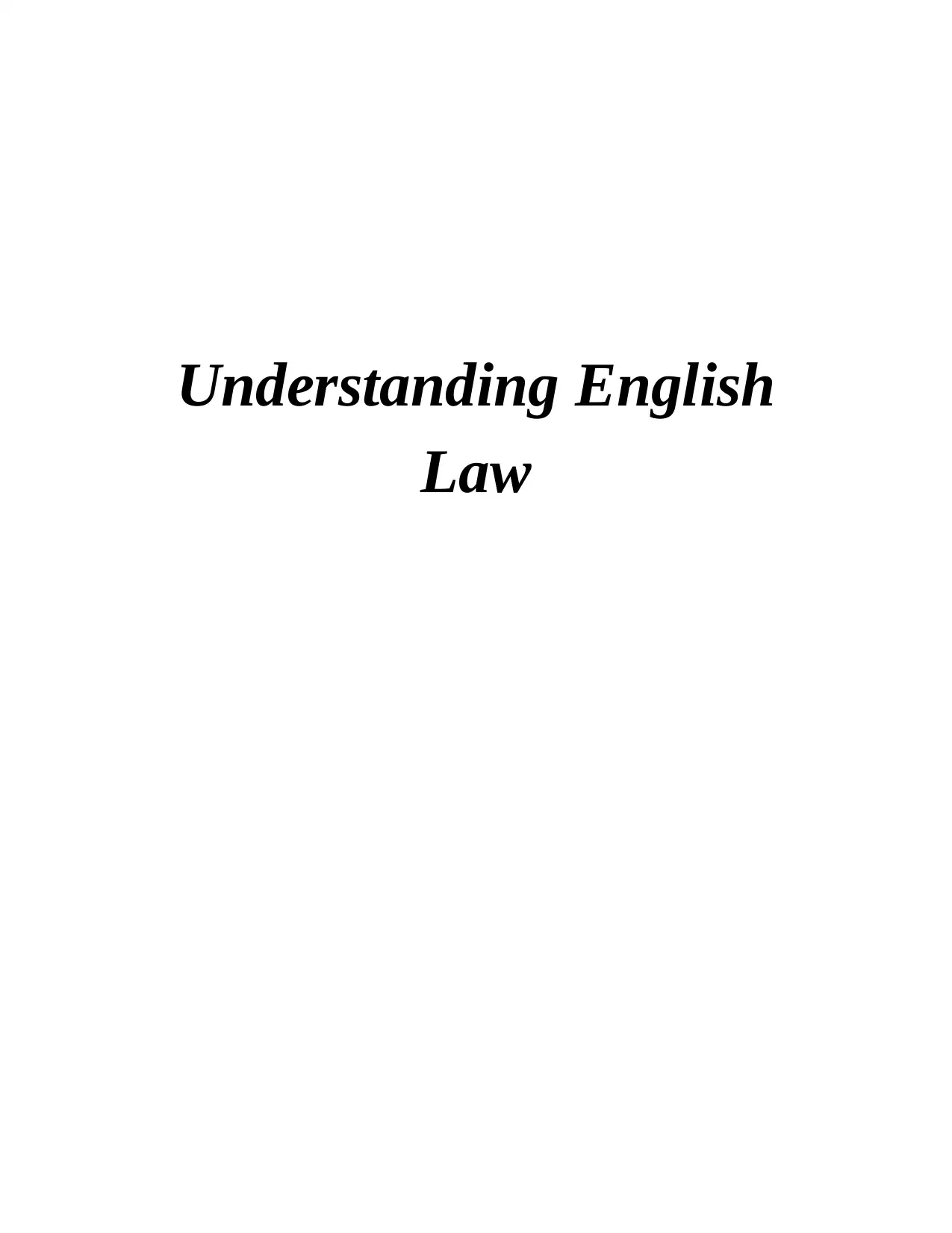
Understanding English
Law
Law
Paraphrase This Document
Need a fresh take? Get an instant paraphrase of this document with our AI Paraphraser
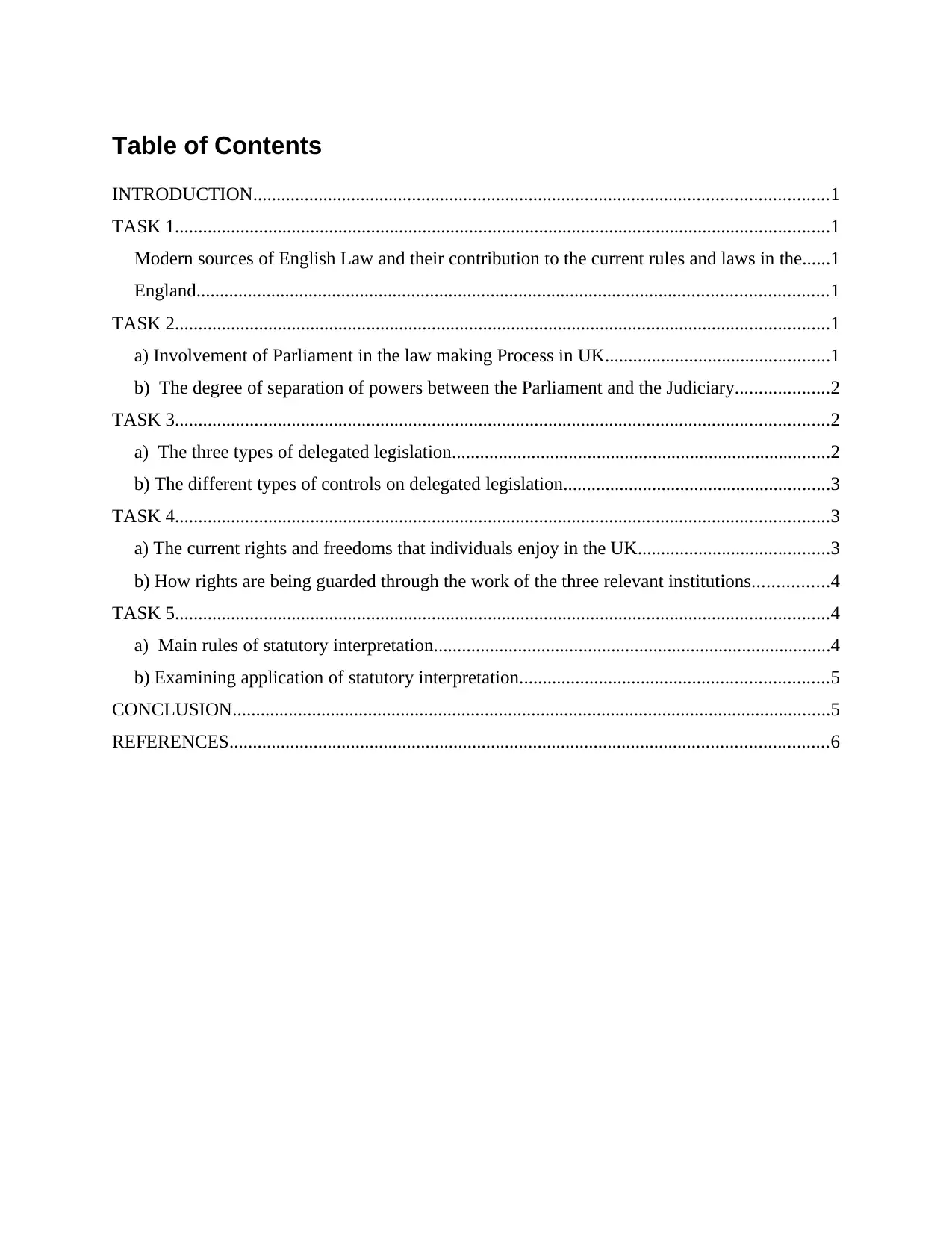
Table of Contents
INTRODUCTION...........................................................................................................................1
TASK 1............................................................................................................................................1
Modern sources of English Law and their contribution to the current rules and laws in the......1
England.......................................................................................................................................1
TASK 2............................................................................................................................................1
a) Involvement of Parliament in the law making Process in UK................................................1
b) The degree of separation of powers between the Parliament and the Judiciary....................2
TASK 3............................................................................................................................................2
a) The three types of delegated legislation.................................................................................2
b) The different types of controls on delegated legislation.........................................................3
TASK 4............................................................................................................................................3
a) The current rights and freedoms that individuals enjoy in the UK.........................................3
b) How rights are being guarded through the work of the three relevant institutions................4
TASK 5............................................................................................................................................4
a) Main rules of statutory interpretation.....................................................................................4
b) Examining application of statutory interpretation..................................................................5
CONCLUSION................................................................................................................................5
REFERENCES................................................................................................................................6
INTRODUCTION...........................................................................................................................1
TASK 1............................................................................................................................................1
Modern sources of English Law and their contribution to the current rules and laws in the......1
England.......................................................................................................................................1
TASK 2............................................................................................................................................1
a) Involvement of Parliament in the law making Process in UK................................................1
b) The degree of separation of powers between the Parliament and the Judiciary....................2
TASK 3............................................................................................................................................2
a) The three types of delegated legislation.................................................................................2
b) The different types of controls on delegated legislation.........................................................3
TASK 4............................................................................................................................................3
a) The current rights and freedoms that individuals enjoy in the UK.........................................3
b) How rights are being guarded through the work of the three relevant institutions................4
TASK 5............................................................................................................................................4
a) Main rules of statutory interpretation.....................................................................................4
b) Examining application of statutory interpretation..................................................................5
CONCLUSION................................................................................................................................5
REFERENCES................................................................................................................................6
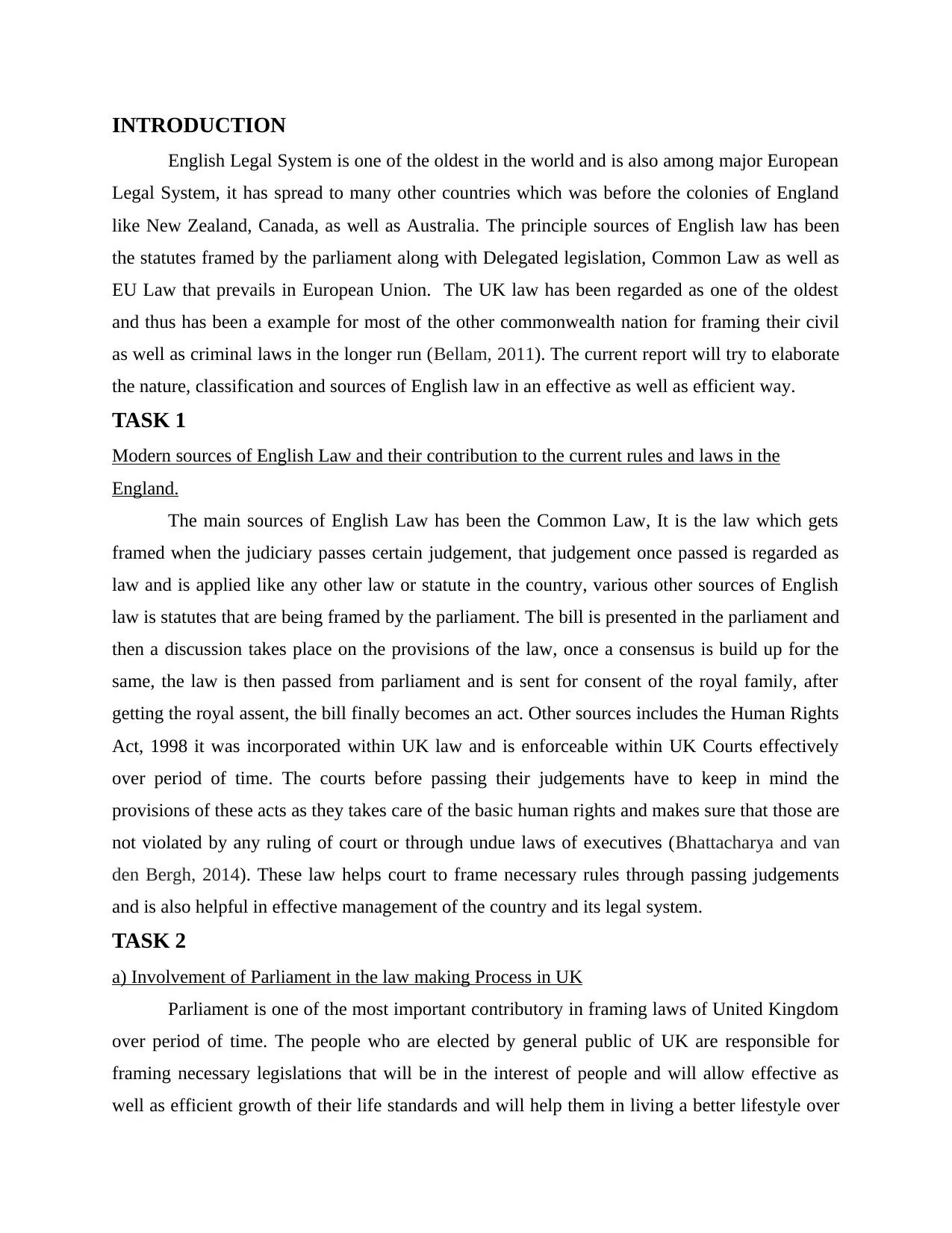
INTRODUCTION
English Legal System is one of the oldest in the world and is also among major European
Legal System, it has spread to many other countries which was before the colonies of England
like New Zealand, Canada, as well as Australia. The principle sources of English law has been
the statutes framed by the parliament along with Delegated legislation, Common Law as well as
EU Law that prevails in European Union. The UK law has been regarded as one of the oldest
and thus has been a example for most of the other commonwealth nation for framing their civil
as well as criminal laws in the longer run (Bellam, 2011). The current report will try to elaborate
the nature, classification and sources of English law in an effective as well as efficient way.
TASK 1
Modern sources of English Law and their contribution to the current rules and laws in the
England.
The main sources of English Law has been the Common Law, It is the law which gets
framed when the judiciary passes certain judgement, that judgement once passed is regarded as
law and is applied like any other law or statute in the country, various other sources of English
law is statutes that are being framed by the parliament. The bill is presented in the parliament and
then a discussion takes place on the provisions of the law, once a consensus is build up for the
same, the law is then passed from parliament and is sent for consent of the royal family, after
getting the royal assent, the bill finally becomes an act. Other sources includes the Human Rights
Act, 1998 it was incorporated within UK law and is enforceable within UK Courts effectively
over period of time. The courts before passing their judgements have to keep in mind the
provisions of these acts as they takes care of the basic human rights and makes sure that those are
not violated by any ruling of court or through undue laws of executives (Bhattacharya and van
den Bergh, 2014). These law helps court to frame necessary rules through passing judgements
and is also helpful in effective management of the country and its legal system.
TASK 2
a) Involvement of Parliament in the law making Process in UK
Parliament is one of the most important contributory in framing laws of United Kingdom
over period of time. The people who are elected by general public of UK are responsible for
framing necessary legislations that will be in the interest of people and will allow effective as
well as efficient growth of their life standards and will help them in living a better lifestyle over
English Legal System is one of the oldest in the world and is also among major European
Legal System, it has spread to many other countries which was before the colonies of England
like New Zealand, Canada, as well as Australia. The principle sources of English law has been
the statutes framed by the parliament along with Delegated legislation, Common Law as well as
EU Law that prevails in European Union. The UK law has been regarded as one of the oldest
and thus has been a example for most of the other commonwealth nation for framing their civil
as well as criminal laws in the longer run (Bellam, 2011). The current report will try to elaborate
the nature, classification and sources of English law in an effective as well as efficient way.
TASK 1
Modern sources of English Law and their contribution to the current rules and laws in the
England.
The main sources of English Law has been the Common Law, It is the law which gets
framed when the judiciary passes certain judgement, that judgement once passed is regarded as
law and is applied like any other law or statute in the country, various other sources of English
law is statutes that are being framed by the parliament. The bill is presented in the parliament and
then a discussion takes place on the provisions of the law, once a consensus is build up for the
same, the law is then passed from parliament and is sent for consent of the royal family, after
getting the royal assent, the bill finally becomes an act. Other sources includes the Human Rights
Act, 1998 it was incorporated within UK law and is enforceable within UK Courts effectively
over period of time. The courts before passing their judgements have to keep in mind the
provisions of these acts as they takes care of the basic human rights and makes sure that those are
not violated by any ruling of court or through undue laws of executives (Bhattacharya and van
den Bergh, 2014). These law helps court to frame necessary rules through passing judgements
and is also helpful in effective management of the country and its legal system.
TASK 2
a) Involvement of Parliament in the law making Process in UK
Parliament is one of the most important contributory in framing laws of United Kingdom
over period of time. The people who are elected by general public of UK are responsible for
framing necessary legislations that will be in the interest of people and will allow effective as
well as efficient growth of their life standards and will help them in living a better lifestyle over
⊘ This is a preview!⊘
Do you want full access?
Subscribe today to unlock all pages.

Trusted by 1+ million students worldwide
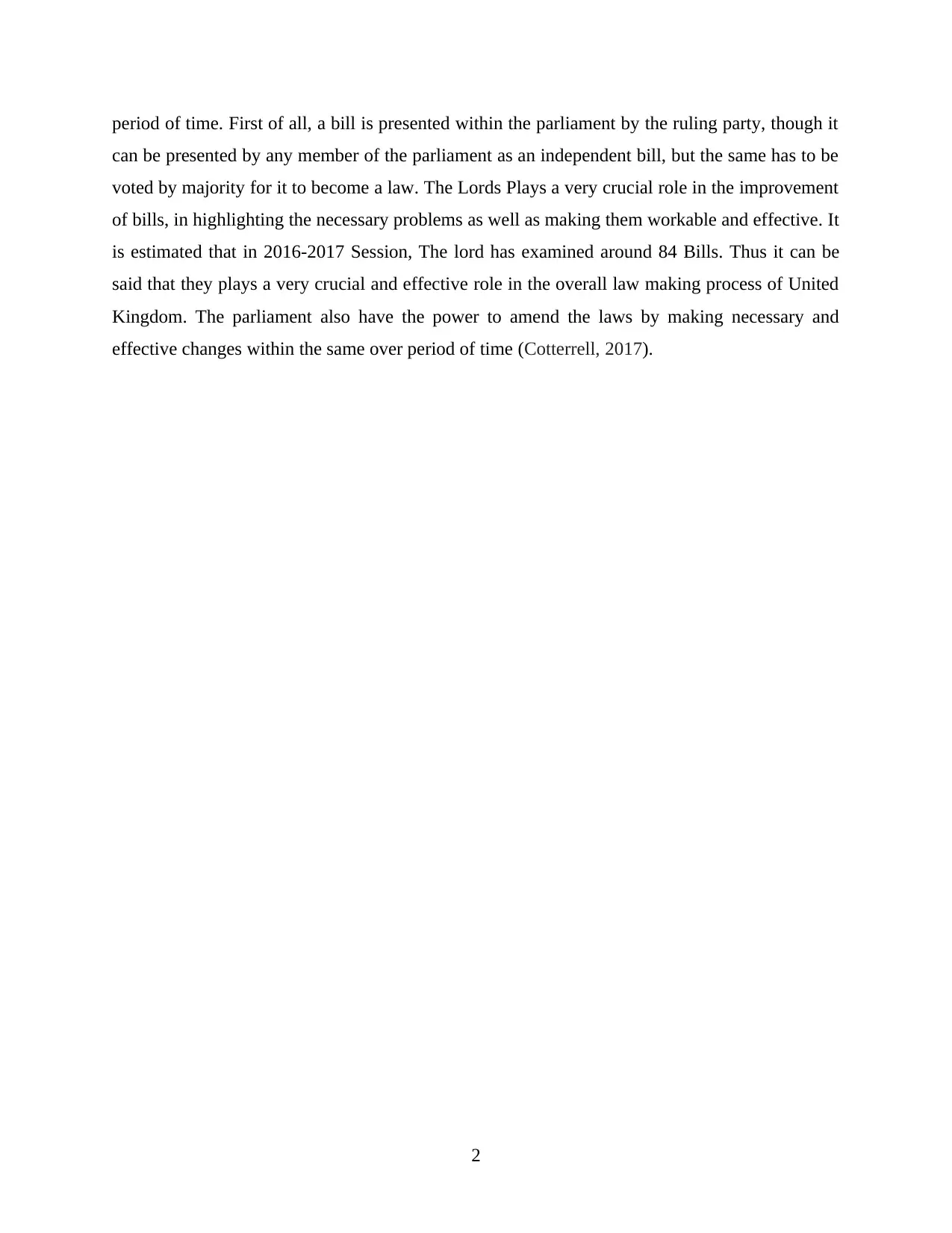
period of time. First of all, a bill is presented within the parliament by the ruling party, though it
can be presented by any member of the parliament as an independent bill, but the same has to be
voted by majority for it to become a law. The Lords Plays a very crucial role in the improvement
of bills, in highlighting the necessary problems as well as making them workable and effective. It
is estimated that in 2016-2017 Session, The lord has examined around 84 Bills. Thus it can be
said that they plays a very crucial and effective role in the overall law making process of United
Kingdom. The parliament also have the power to amend the laws by making necessary and
effective changes within the same over period of time (Cotterrell, 2017).
2
can be presented by any member of the parliament as an independent bill, but the same has to be
voted by majority for it to become a law. The Lords Plays a very crucial role in the improvement
of bills, in highlighting the necessary problems as well as making them workable and effective. It
is estimated that in 2016-2017 Session, The lord has examined around 84 Bills. Thus it can be
said that they plays a very crucial and effective role in the overall law making process of United
Kingdom. The parliament also have the power to amend the laws by making necessary and
effective changes within the same over period of time (Cotterrell, 2017).
2
Paraphrase This Document
Need a fresh take? Get an instant paraphrase of this document with our AI Paraphraser
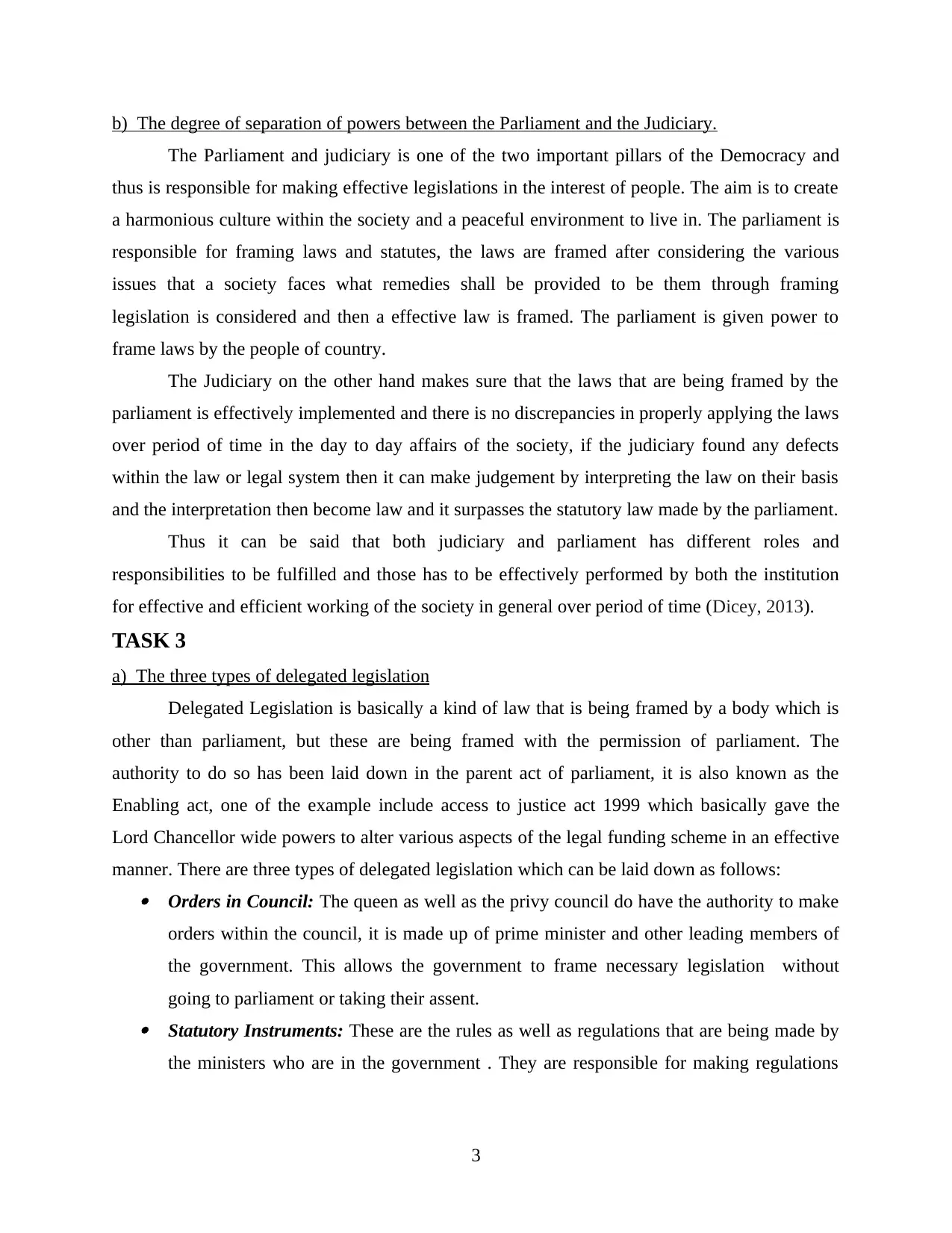
b) The degree of separation of powers between the Parliament and the Judiciary.
The Parliament and judiciary is one of the two important pillars of the Democracy and
thus is responsible for making effective legislations in the interest of people. The aim is to create
a harmonious culture within the society and a peaceful environment to live in. The parliament is
responsible for framing laws and statutes, the laws are framed after considering the various
issues that a society faces what remedies shall be provided to be them through framing
legislation is considered and then a effective law is framed. The parliament is given power to
frame laws by the people of country.
The Judiciary on the other hand makes sure that the laws that are being framed by the
parliament is effectively implemented and there is no discrepancies in properly applying the laws
over period of time in the day to day affairs of the society, if the judiciary found any defects
within the law or legal system then it can make judgement by interpreting the law on their basis
and the interpretation then become law and it surpasses the statutory law made by the parliament.
Thus it can be said that both judiciary and parliament has different roles and
responsibilities to be fulfilled and those has to be effectively performed by both the institution
for effective and efficient working of the society in general over period of time (Dicey, 2013).
TASK 3
a) The three types of delegated legislation
Delegated Legislation is basically a kind of law that is being framed by a body which is
other than parliament, but these are being framed with the permission of parliament. The
authority to do so has been laid down in the parent act of parliament, it is also known as the
Enabling act, one of the example include access to justice act 1999 which basically gave the
Lord Chancellor wide powers to alter various aspects of the legal funding scheme in an effective
manner. There are three types of delegated legislation which can be laid down as follows: Orders in Council: The queen as well as the privy council do have the authority to make
orders within the council, it is made up of prime minister and other leading members of
the government. This allows the government to frame necessary legislation without
going to parliament or taking their assent. Statutory Instruments: These are the rules as well as regulations that are being made by
the ministers who are in the government . They are responsible for making regulations
3
The Parliament and judiciary is one of the two important pillars of the Democracy and
thus is responsible for making effective legislations in the interest of people. The aim is to create
a harmonious culture within the society and a peaceful environment to live in. The parliament is
responsible for framing laws and statutes, the laws are framed after considering the various
issues that a society faces what remedies shall be provided to be them through framing
legislation is considered and then a effective law is framed. The parliament is given power to
frame laws by the people of country.
The Judiciary on the other hand makes sure that the laws that are being framed by the
parliament is effectively implemented and there is no discrepancies in properly applying the laws
over period of time in the day to day affairs of the society, if the judiciary found any defects
within the law or legal system then it can make judgement by interpreting the law on their basis
and the interpretation then become law and it surpasses the statutory law made by the parliament.
Thus it can be said that both judiciary and parliament has different roles and
responsibilities to be fulfilled and those has to be effectively performed by both the institution
for effective and efficient working of the society in general over period of time (Dicey, 2013).
TASK 3
a) The three types of delegated legislation
Delegated Legislation is basically a kind of law that is being framed by a body which is
other than parliament, but these are being framed with the permission of parliament. The
authority to do so has been laid down in the parent act of parliament, it is also known as the
Enabling act, one of the example include access to justice act 1999 which basically gave the
Lord Chancellor wide powers to alter various aspects of the legal funding scheme in an effective
manner. There are three types of delegated legislation which can be laid down as follows: Orders in Council: The queen as well as the privy council do have the authority to make
orders within the council, it is made up of prime minister and other leading members of
the government. This allows the government to frame necessary legislation without
going to parliament or taking their assent. Statutory Instruments: These are the rules as well as regulations that are being made by
the ministers who are in the government . They are responsible for making regulations
3
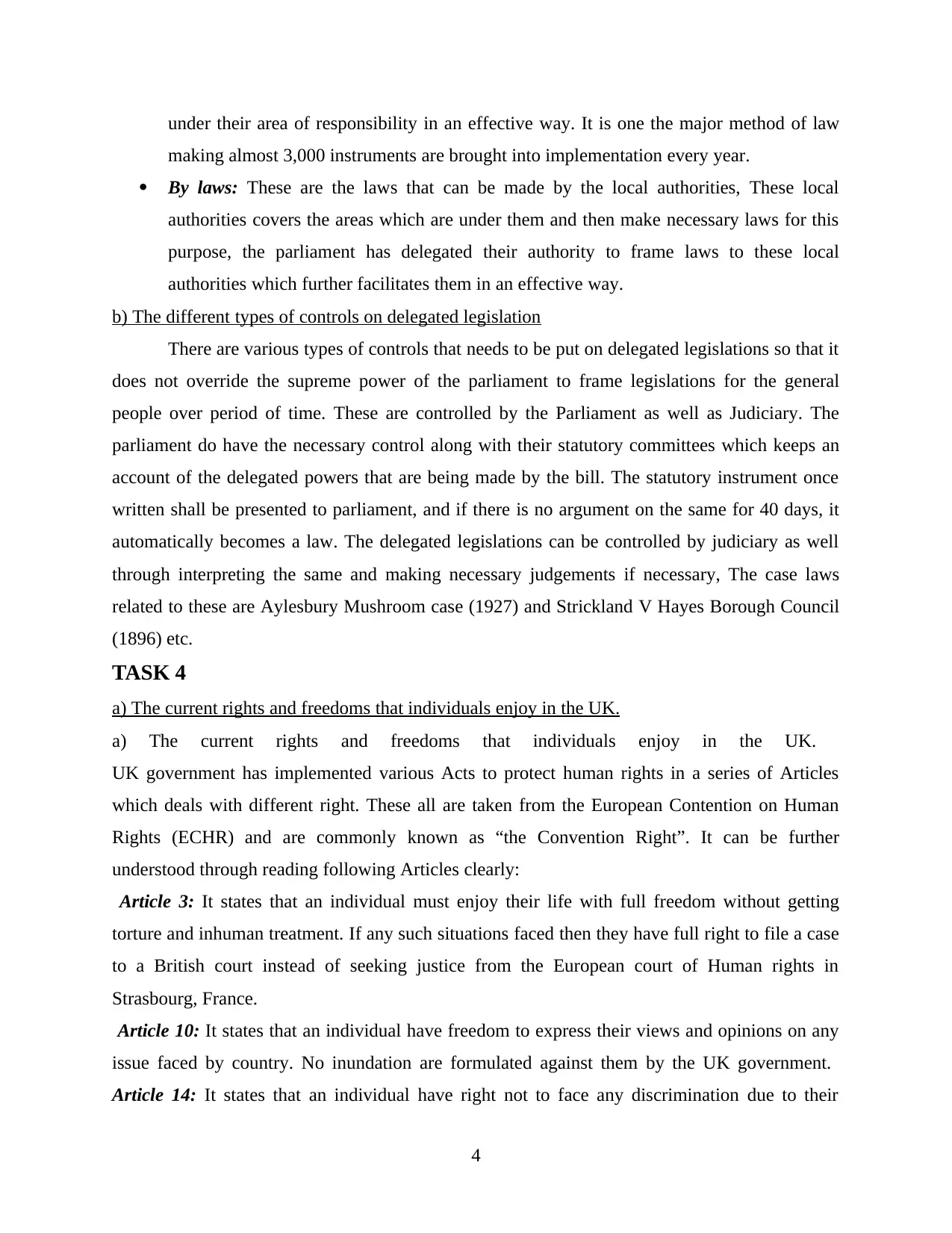
under their area of responsibility in an effective way. It is one the major method of law
making almost 3,000 instruments are brought into implementation every year.
By laws: These are the laws that can be made by the local authorities, These local
authorities covers the areas which are under them and then make necessary laws for this
purpose, the parliament has delegated their authority to frame laws to these local
authorities which further facilitates them in an effective way.
b) The different types of controls on delegated legislation
There are various types of controls that needs to be put on delegated legislations so that it
does not override the supreme power of the parliament to frame legislations for the general
people over period of time. These are controlled by the Parliament as well as Judiciary. The
parliament do have the necessary control along with their statutory committees which keeps an
account of the delegated powers that are being made by the bill. The statutory instrument once
written shall be presented to parliament, and if there is no argument on the same for 40 days, it
automatically becomes a law. The delegated legislations can be controlled by judiciary as well
through interpreting the same and making necessary judgements if necessary, The case laws
related to these are Aylesbury Mushroom case (1927) and Strickland V Hayes Borough Council
(1896) etc.
TASK 4
a) The current rights and freedoms that individuals enjoy in the UK.
a) The current rights and freedoms that individuals enjoy in the UK.
UK government has implemented various Acts to protect human rights in a series of Articles
which deals with different right. These all are taken from the European Contention on Human
Rights (ECHR) and are commonly known as “the Convention Right”. It can be further
understood through reading following Articles clearly:
Article 3: It states that an individual must enjoy their life with full freedom without getting
torture and inhuman treatment. If any such situations faced then they have full right to file a case
to a British court instead of seeking justice from the European court of Human rights in
Strasbourg, France.
Article 10: It states that an individual have freedom to express their views and opinions on any
issue faced by country. No inundation are formulated against them by the UK government.
Article 14: It states that an individual have right not to face any discrimination due to their
4
making almost 3,000 instruments are brought into implementation every year.
By laws: These are the laws that can be made by the local authorities, These local
authorities covers the areas which are under them and then make necessary laws for this
purpose, the parliament has delegated their authority to frame laws to these local
authorities which further facilitates them in an effective way.
b) The different types of controls on delegated legislation
There are various types of controls that needs to be put on delegated legislations so that it
does not override the supreme power of the parliament to frame legislations for the general
people over period of time. These are controlled by the Parliament as well as Judiciary. The
parliament do have the necessary control along with their statutory committees which keeps an
account of the delegated powers that are being made by the bill. The statutory instrument once
written shall be presented to parliament, and if there is no argument on the same for 40 days, it
automatically becomes a law. The delegated legislations can be controlled by judiciary as well
through interpreting the same and making necessary judgements if necessary, The case laws
related to these are Aylesbury Mushroom case (1927) and Strickland V Hayes Borough Council
(1896) etc.
TASK 4
a) The current rights and freedoms that individuals enjoy in the UK.
a) The current rights and freedoms that individuals enjoy in the UK.
UK government has implemented various Acts to protect human rights in a series of Articles
which deals with different right. These all are taken from the European Contention on Human
Rights (ECHR) and are commonly known as “the Convention Right”. It can be further
understood through reading following Articles clearly:
Article 3: It states that an individual must enjoy their life with full freedom without getting
torture and inhuman treatment. If any such situations faced then they have full right to file a case
to a British court instead of seeking justice from the European court of Human rights in
Strasbourg, France.
Article 10: It states that an individual have freedom to express their views and opinions on any
issue faced by country. No inundation are formulated against them by the UK government.
Article 14: It states that an individual have right not to face any discrimination due to their
4
⊘ This is a preview!⊘
Do you want full access?
Subscribe today to unlock all pages.

Trusted by 1+ million students worldwide
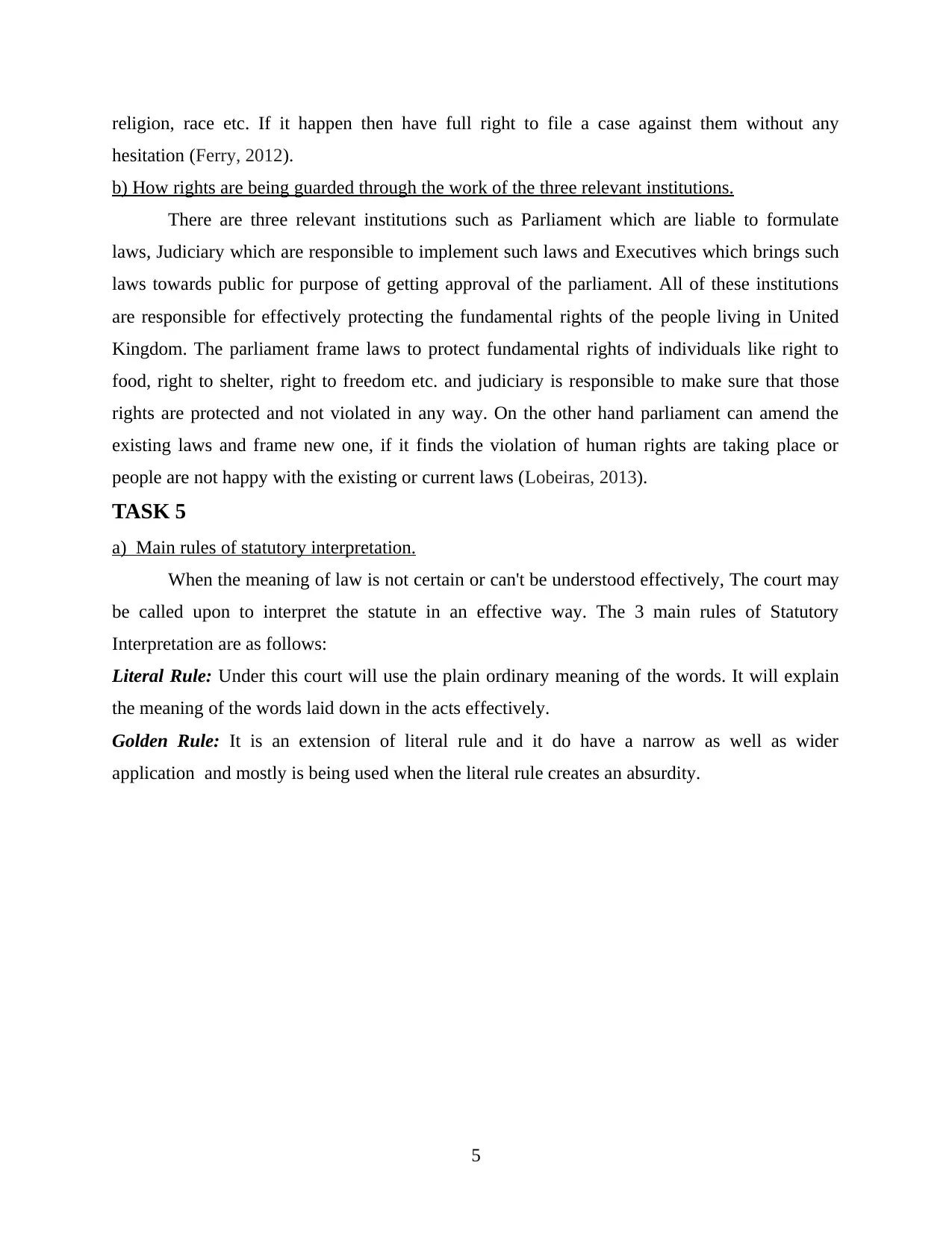
religion, race etc. If it happen then have full right to file a case against them without any
hesitation (Ferry, 2012).
b) How rights are being guarded through the work of the three relevant institutions.
There are three relevant institutions such as Parliament which are liable to formulate
laws, Judiciary which are responsible to implement such laws and Executives which brings such
laws towards public for purpose of getting approval of the parliament. All of these institutions
are responsible for effectively protecting the fundamental rights of the people living in United
Kingdom. The parliament frame laws to protect fundamental rights of individuals like right to
food, right to shelter, right to freedom etc. and judiciary is responsible to make sure that those
rights are protected and not violated in any way. On the other hand parliament can amend the
existing laws and frame new one, if it finds the violation of human rights are taking place or
people are not happy with the existing or current laws (Lobeiras, 2013).
TASK 5
a) Main rules of statutory interpretation.
When the meaning of law is not certain or can't be understood effectively, The court may
be called upon to interpret the statute in an effective way. The 3 main rules of Statutory
Interpretation are as follows:
Literal Rule: Under this court will use the plain ordinary meaning of the words. It will explain
the meaning of the words laid down in the acts effectively.
Golden Rule: It is an extension of literal rule and it do have a narrow as well as wider
application and mostly is being used when the literal rule creates an absurdity.
5
hesitation (Ferry, 2012).
b) How rights are being guarded through the work of the three relevant institutions.
There are three relevant institutions such as Parliament which are liable to formulate
laws, Judiciary which are responsible to implement such laws and Executives which brings such
laws towards public for purpose of getting approval of the parliament. All of these institutions
are responsible for effectively protecting the fundamental rights of the people living in United
Kingdom. The parliament frame laws to protect fundamental rights of individuals like right to
food, right to shelter, right to freedom etc. and judiciary is responsible to make sure that those
rights are protected and not violated in any way. On the other hand parliament can amend the
existing laws and frame new one, if it finds the violation of human rights are taking place or
people are not happy with the existing or current laws (Lobeiras, 2013).
TASK 5
a) Main rules of statutory interpretation.
When the meaning of law is not certain or can't be understood effectively, The court may
be called upon to interpret the statute in an effective way. The 3 main rules of Statutory
Interpretation are as follows:
Literal Rule: Under this court will use the plain ordinary meaning of the words. It will explain
the meaning of the words laid down in the acts effectively.
Golden Rule: It is an extension of literal rule and it do have a narrow as well as wider
application and mostly is being used when the literal rule creates an absurdity.
5
Paraphrase This Document
Need a fresh take? Get an instant paraphrase of this document with our AI Paraphraser
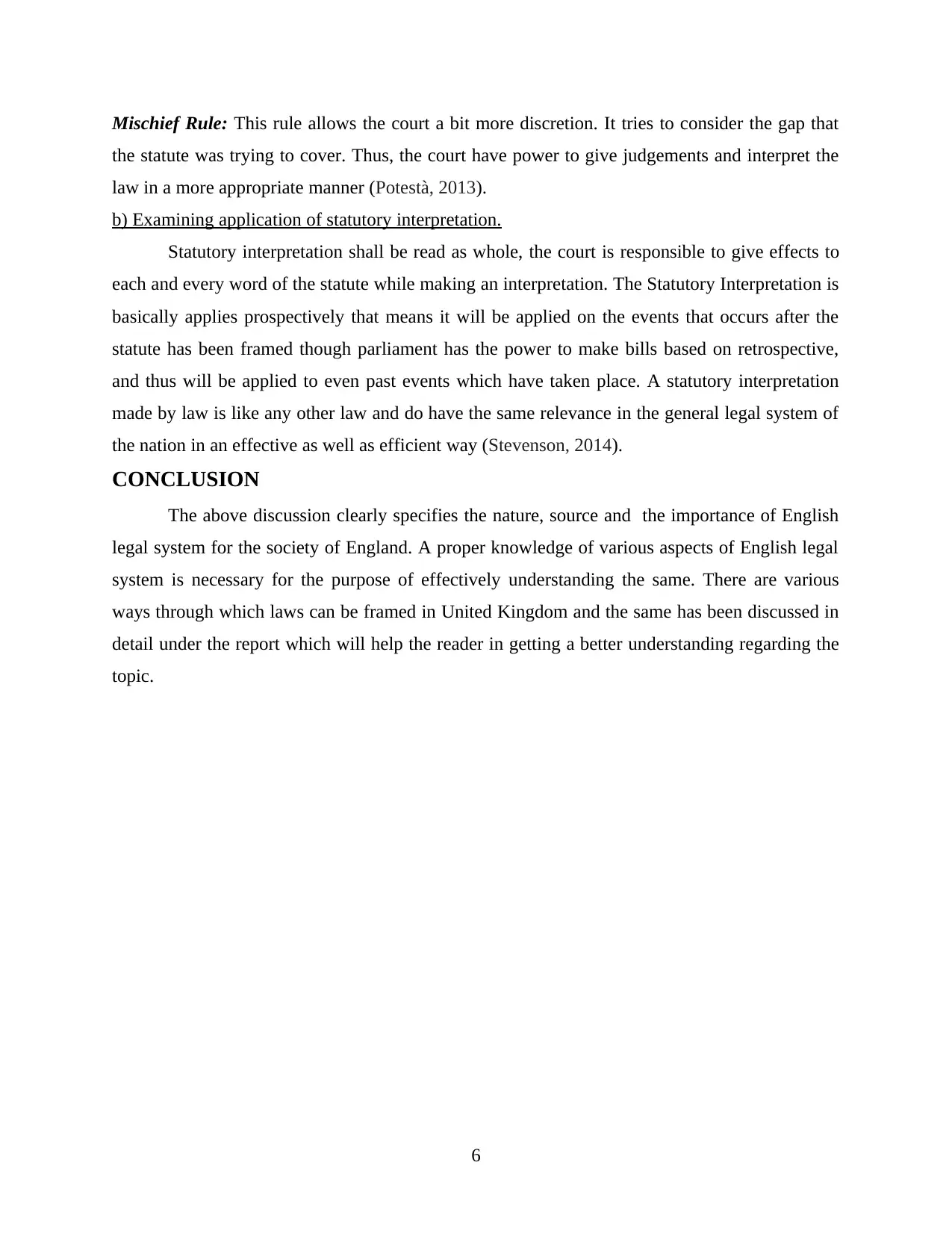
Mischief Rule: This rule allows the court a bit more discretion. It tries to consider the gap that
the statute was trying to cover. Thus, the court have power to give judgements and interpret the
law in a more appropriate manner (Potestà, 2013).
b) Examining application of statutory interpretation.
Statutory interpretation shall be read as whole, the court is responsible to give effects to
each and every word of the statute while making an interpretation. The Statutory Interpretation is
basically applies prospectively that means it will be applied on the events that occurs after the
statute has been framed though parliament has the power to make bills based on retrospective,
and thus will be applied to even past events which have taken place. A statutory interpretation
made by law is like any other law and do have the same relevance in the general legal system of
the nation in an effective as well as efficient way (Stevenson, 2014).
CONCLUSION
The above discussion clearly specifies the nature, source and the importance of English
legal system for the society of England. A proper knowledge of various aspects of English legal
system is necessary for the purpose of effectively understanding the same. There are various
ways through which laws can be framed in United Kingdom and the same has been discussed in
detail under the report which will help the reader in getting a better understanding regarding the
topic.
6
the statute was trying to cover. Thus, the court have power to give judgements and interpret the
law in a more appropriate manner (Potestà, 2013).
b) Examining application of statutory interpretation.
Statutory interpretation shall be read as whole, the court is responsible to give effects to
each and every word of the statute while making an interpretation. The Statutory Interpretation is
basically applies prospectively that means it will be applied on the events that occurs after the
statute has been framed though parliament has the power to make bills based on retrospective,
and thus will be applied to even past events which have taken place. A statutory interpretation
made by law is like any other law and do have the same relevance in the general legal system of
the nation in an effective as well as efficient way (Stevenson, 2014).
CONCLUSION
The above discussion clearly specifies the nature, source and the importance of English
legal system for the society of England. A proper knowledge of various aspects of English legal
system is necessary for the purpose of effectively understanding the same. There are various
ways through which laws can be framed in United Kingdom and the same has been discussed in
detail under the report which will help the reader in getting a better understanding regarding the
topic.
6
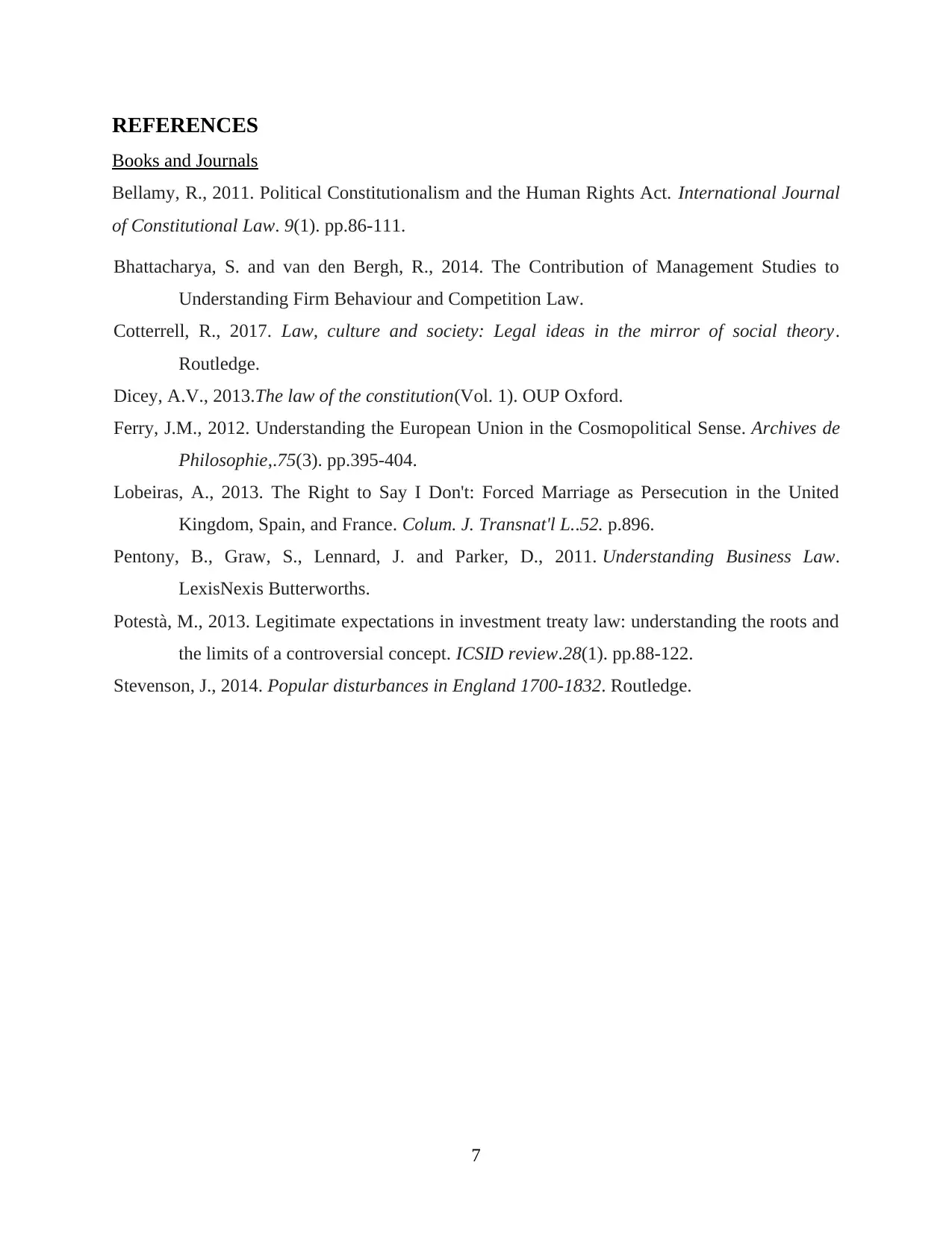
REFERENCES
Books and Journals
Bellamy, R., 2011. Political Constitutionalism and the Human Rights Act. International Journal
of Constitutional Law. 9(1). pp.86-111.
Bhattacharya, S. and van den Bergh, R., 2014. The Contribution of Management Studies to
Understanding Firm Behaviour and Competition Law.
Cotterrell, R., 2017. Law, culture and society: Legal ideas in the mirror of social theory.
Routledge.
Dicey, A.V., 2013.The law of the constitution(Vol. 1). OUP Oxford.
Ferry, J.M., 2012. Understanding the European Union in the Cosmopolitical Sense. Archives de
Philosophie,.75(3). pp.395-404.
Lobeiras, A., 2013. The Right to Say I Don't: Forced Marriage as Persecution in the United
Kingdom, Spain, and France. Colum. J. Transnat'l L..52. p.896.
Pentony, B., Graw, S., Lennard, J. and Parker, D., 2011. Understanding Business Law.
LexisNexis Butterworths.
Potestà, M., 2013. Legitimate expectations in investment treaty law: understanding the roots and
the limits of a controversial concept. ICSID review.28(1). pp.88-122.
Stevenson, J., 2014. Popular disturbances in England 1700-1832. Routledge.
7
Books and Journals
Bellamy, R., 2011. Political Constitutionalism and the Human Rights Act. International Journal
of Constitutional Law. 9(1). pp.86-111.
Bhattacharya, S. and van den Bergh, R., 2014. The Contribution of Management Studies to
Understanding Firm Behaviour and Competition Law.
Cotterrell, R., 2017. Law, culture and society: Legal ideas in the mirror of social theory.
Routledge.
Dicey, A.V., 2013.The law of the constitution(Vol. 1). OUP Oxford.
Ferry, J.M., 2012. Understanding the European Union in the Cosmopolitical Sense. Archives de
Philosophie,.75(3). pp.395-404.
Lobeiras, A., 2013. The Right to Say I Don't: Forced Marriage as Persecution in the United
Kingdom, Spain, and France. Colum. J. Transnat'l L..52. p.896.
Pentony, B., Graw, S., Lennard, J. and Parker, D., 2011. Understanding Business Law.
LexisNexis Butterworths.
Potestà, M., 2013. Legitimate expectations in investment treaty law: understanding the roots and
the limits of a controversial concept. ICSID review.28(1). pp.88-122.
Stevenson, J., 2014. Popular disturbances in England 1700-1832. Routledge.
7
⊘ This is a preview!⊘
Do you want full access?
Subscribe today to unlock all pages.

Trusted by 1+ million students worldwide
1 out of 9
Related Documents
Your All-in-One AI-Powered Toolkit for Academic Success.
+13062052269
info@desklib.com
Available 24*7 on WhatsApp / Email
![[object Object]](/_next/static/media/star-bottom.7253800d.svg)
Unlock your academic potential
Copyright © 2020–2026 A2Z Services. All Rights Reserved. Developed and managed by ZUCOL.





